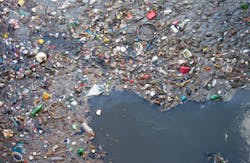A new study published in the journal Science claims that more than 4.8 million metric tons of plastic waste end up in the oceans from land each year, and the figure could be as high as 12.7 million metric tons. That's one to three orders of magnitude greater than the previously reported mass of plastic floating in the oceans.
The research is claimed to be the first to quantify the worldwide amount of plastic debris entering the ocean from land. It was conducted by a scientific working group at the National Center for Ecological Analysis and Synthesis at the University of California, Santa Barbara (UCSB), with support from the Washington, D.C.-based Ocean Conservancy. Lead author Jenna Jambeck, an environmental engineer at the University of Georgia, coordinated contributions from experts in oceanography, waste management and plastics materials science.
Using 8 million metric tons as the midpoint, Jambeck explained what this volume of waste equates to: "Eight million metric tons is the equivalent to finding five grocery bags full of plastic on every foot of coastline in the 192 countries we examined."
According to the study, the largest quantities of plastic in the world's oceans come from a relatively small number of middle-income, rapidly developing coastal countries. The investigators found that the top 20 of these countries account for 83 percent of the mismanaged plastic waste available to enter the ocean. They said that reducing the amount of this waste by 50 percent would result in a nearly 40 percent decline in the volume of plastic discharged into the ocean.
"Large-scale removal of plastic marine debris is not going to be cost-effective and quite likely simply unfeasible," commented co-author Roland Geyer, an associate professor at UCSB's Bren School of Environmental Science & Management. "This means that we need to prevent plastic from entering the oceans in the first place through better waste management, more reuse and recycling, better product design and material substitution."
This assessment was supported by another co-author, Kara Lavender Law from the Sea Education Association, who said: "My feeling is that we are far better off trying to stop the input into the ocean. Even if we could go out and collect all these little bits of micro-plastic, we are not going to solve the problem unless we turn off the tap."
The researchers called for nations around the world to reduce their plastic waste and improve their waste management infrastructure.
Responding to the report, Steve Russell, vice president of the American Chemistry Council's plastics division, said it was important to stop all waste, including plastics, from getting into the oceans in the first place.
"Used plastics should be treated as valuable resources and recycled whenever possible or recovered for their energy value when recycling is not feasible," he added.


